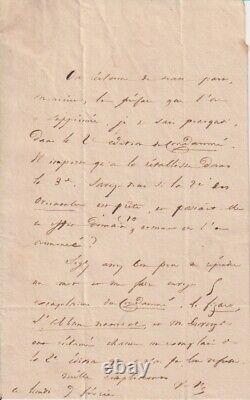
- Homepage
- Author
- Alexandre Dumas Son (2)
- Anatole France (3)
- Chateaubriand (4)
- Gus Bofa (2)
- Henri Lavoix (2)
- Henri Lebasque (2)
- Jean Couty (2)
- Jean-léon Gérôme (5)
- Julien DuprÉ (2)
- Louise Read (2)
- Lucien Besnard (2)
- Marcel AymÉ (2)
- Marcel Proust (2)
- Mesrine (2)
- Michel Chamillart (2)
- Miguel ZamacoÏs (2)
- Paul Chabas (2)
- Roger Martin Du Gard (2)
- Sully Prudhomme (5)
- Violette Leduc (3)
- Other (3071)
- Binding
- Era
- Language
- Period
- Subject
VICTOR HUGO handwritten signed letter THE LAST DAY OF A CONDEMNED/ORIENTALES



VICTOR HUGO GIVES HIS INSTRUCTIONS. FOR THE PUBLICATION OF THE LAST DAY OF A CONDEMNED MAN. Signed autograph letter, without location, February 9, 1829. 1 page in-8, autograph address with coat of arms.
Interesting early letter from the great writer, giving his publisher instructions for the publication of The Last Day of a Condemned Man and The Orientals. "The preface that was suppressed for some reason in the 2nd edition of The Condemned is being requested from all sides, Sir.It is important that it be restored in the 3rd. Do you know if the 2nd of The Orientals is ready, and does it actually appear tomorrow, the 10th as announced? Please be so kind as to reply with a word and send me 5 copies of The Condemned.
Le Figaro, L'Album national. Duverger each requested a copy of the 2nd edition, which I could not refuse them. The mail is addressed to "Mr.Gosselin, 9 rue St Germain des prés", the address sheet is also signed with the initials V. (1) This is a review of criticism and current music, artistic and literary news. In this year 1829, it published laudatory articles on The Orientals as well as on The Last Day of a Condemned Man, which was received in these terms: "The tireless Mr. Victor Hugo has just published under the title The Last Day of a Condemned Man a new work as interesting for its subject matter as it is pungent for the bizarre form that the author has adopted. Victor Hugo, revolted by the death penalty, wishes to write a plea in the form of a novel, from the point of view of the condemned man.
This audacious literary project does not immediately receive the approval of his editor, Charles Gosselin, the recipient of our letter. The latter has just published The Orientals, a virtuoso poetic collection of about forty pieces marked by romantic philhellenism, which includes the famous poem The Djinns. If The Orientals are a powerful aesthetic evocation, Hugo's new book, The Last Day of a Condemned Man, aims to be a political work as well as a literary one.Gosselin is skeptical of the audacity of the book's plan: can a diary written by the condemned man himself be the subject of a novel? Where would the action be?
Victor Hugo sticks to his plans, and writes a first preface in February 1829, which can be summed up in these few enigmatic sentences. There are two ways to account for the existence of this book. Either there were, in fact, a bundle of yellow and uneven papers on which were recorded one by one the last thoughts of a wretched man; or there met a man, a dreamer occupied in observing nature for the sake of art, a philosopher, a poet, what do I know? Whose fancy this idea was, who took it or rather let himself be taken by it, and could not rid himself of it except by throwing it into a book.
Of these two explanations, the reader will choose whichever he pleases. Hugo, aware of the risks, first publishes the work anonymously.
However, tongues soon wag and the name of Victor Hugo circulates, dragged through the mud by numerous opponents to his ideas perhaps even more than to his style. Hugo decides to respond to his detractors in his 3rd edition of late February 1829 with a new preface in the form of a parodic skit ridiculing the fallacious arguments that are opposed to him: ".
A drama, a novel proves nothing. And then, I read the book, and it is bad.," one of the characters says.
Although mocking, Victor Hugo will indeed suffer from this reproach: why produce a psychological portrait rather than a rational argument? Sensible to these criticisms, Hugo takes up the pen again in 1832 on the occasion of a reissue and signs a new masterful preface, the one that will remain as his true indictment against the death penalty. The writer states, "The Last Day of a Condemned Man is nothing other than a plea, direct or indirect, as you wish, for the abolition of the death penalty. What he intended to do, what he would like posterity to see in his work, if ever it concerns itself with so little, is not the specific, and always easy, and always transitory, defense of this or that chosen criminal, of this or that accused by election; it is the general and permanent plea for all present and future accused. This preface will ultimately establish The Last Day of a Condemned Man as a flagship work by Victor Hugo and a major milestone towards abolition.CERTIFICATE OF AUTHENTICITY AVAILABLE UPON REQUEST.

